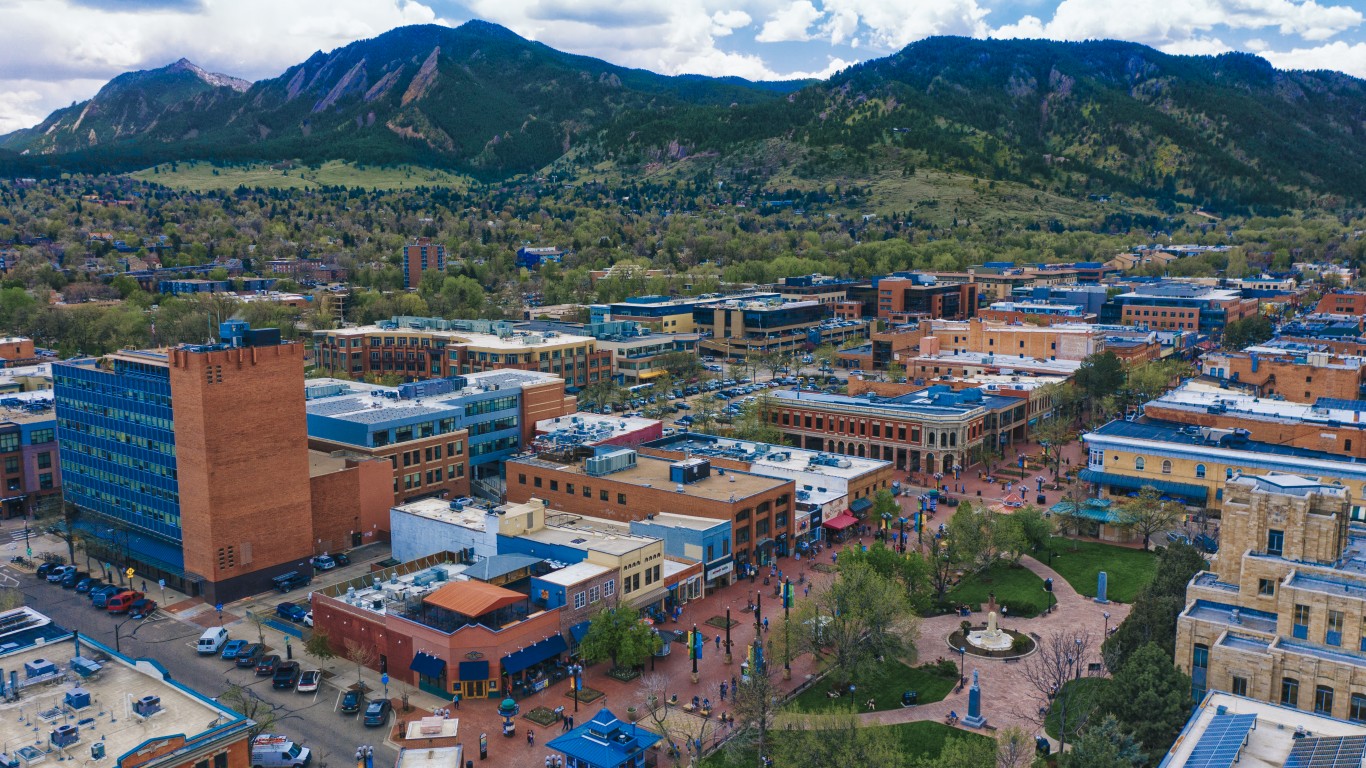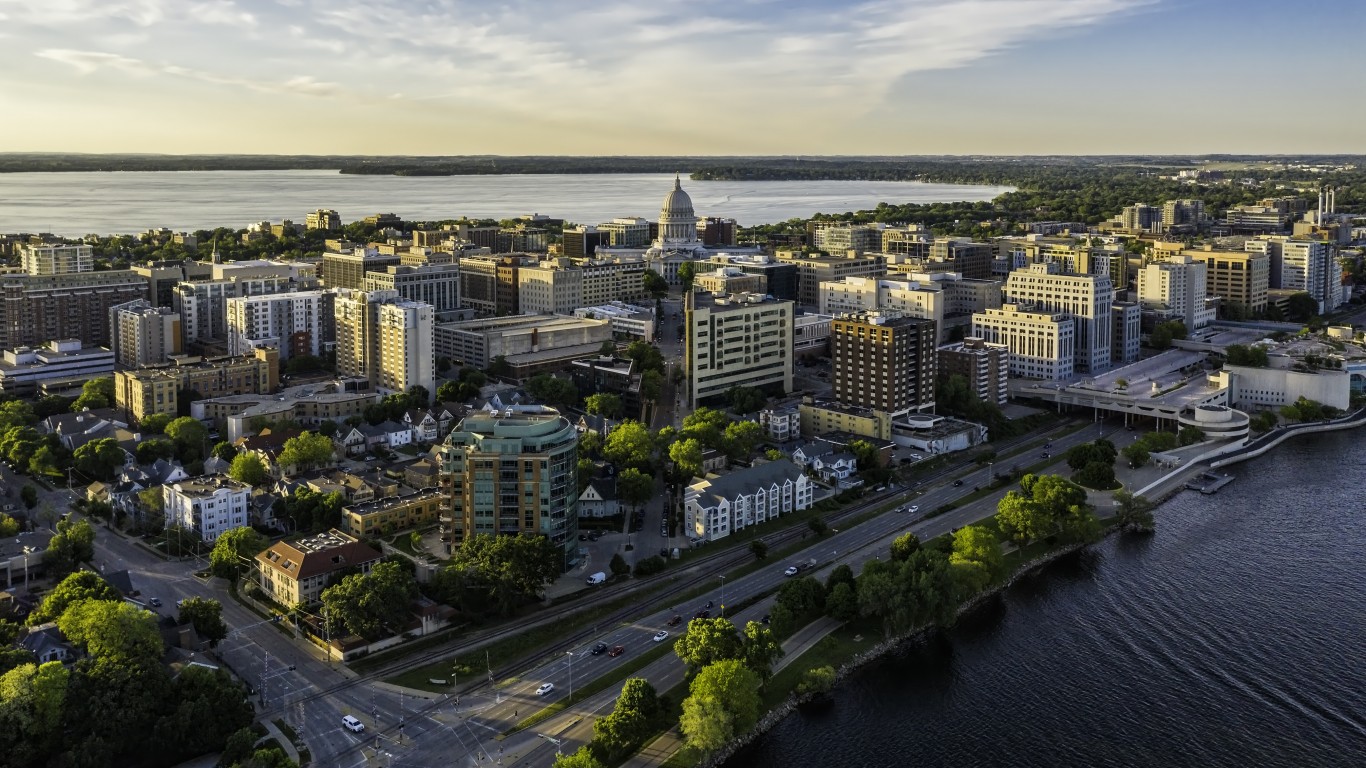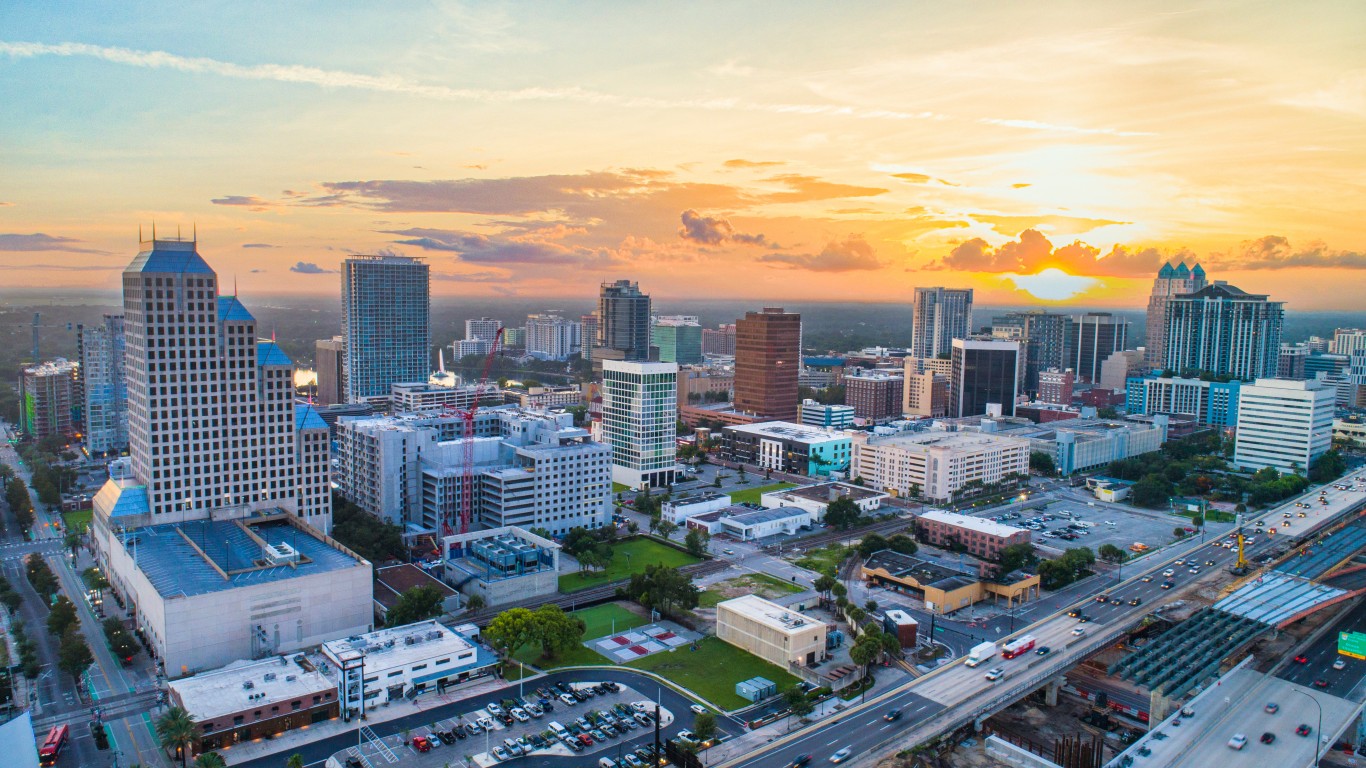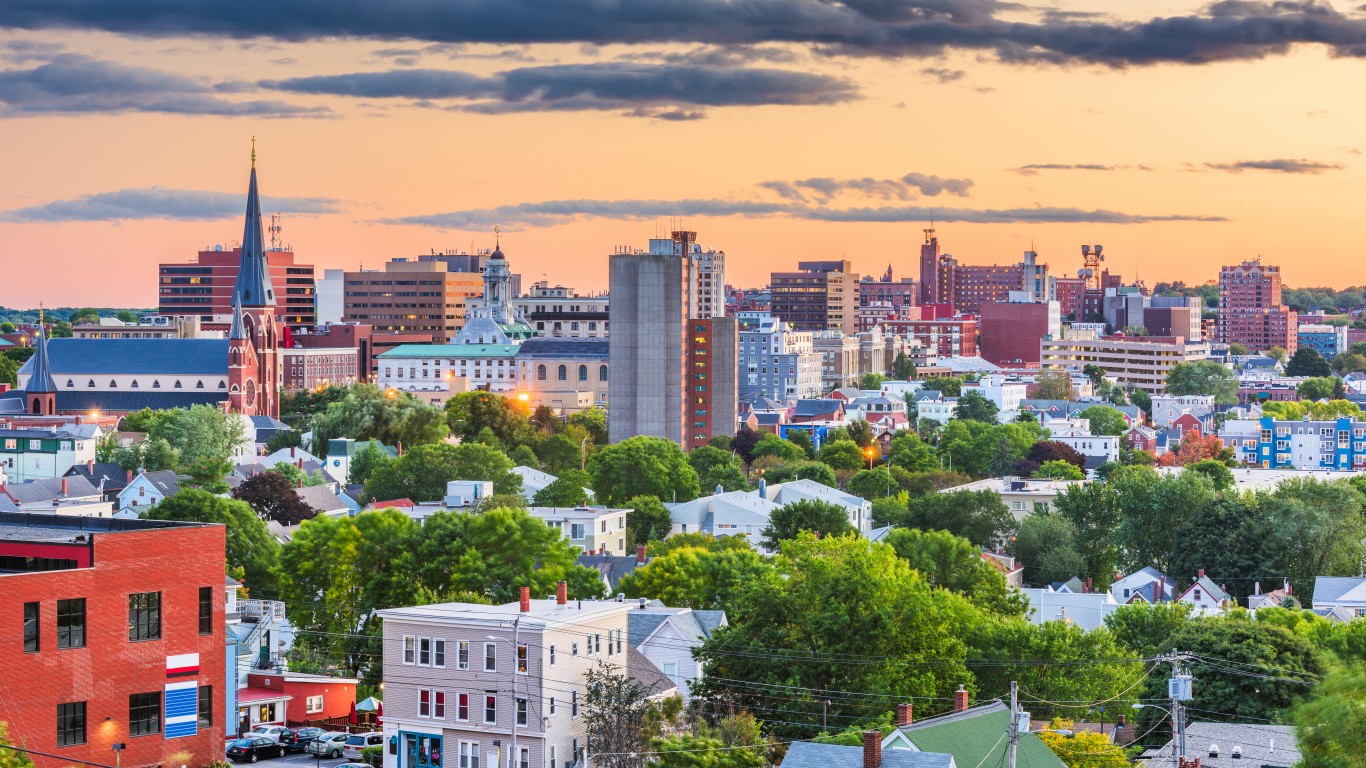Special Report
Cities With the Fastest Growing High-Tech Sectors

Published:
Last Updated:

Technology is a crucial driver of economic growth. It raises the productivity of existing industries and creates new ones. Areas with booming high tech sectors often have thriving economies and strong socioeconomic indicators. The tech sector also generates high-paying jobs. (These are the best paying jobs in America.)
To determine the cities with the fastest growing high-tech sectors, 24/7 Wall St. reviewed employment data by industry from the Bureau of Labor Statistics Quarterly Census of Employment and Wages. Metropolitan statistical areas were ranked by the percentage increase in employment in “high-tech” industries from 2015 to 2020. The BLS defines high-tech industries as those with a high concentration of STEM (science, technology, engineering, and mathematics) occupations.
It is important to note that high-tech is more than semiconductors and computers. It extends to chemicals, pharmaceuticals, aerospace products, and other industries. Also, as is clear from our list, U.S.’s high-tech industry is not all concentrated in Silicon Valley. There are cities with fast-growing high-tech sectors all across the country. In fact, the top three cities are not generally regarded as tech centers.
At No. 1 is Bend-Redmond, Oregon. Its fastest growing high-tech industry is management of companies and enterprises, which experienced 237.3% growth between 2015 and 2020. The No. 2 and No. 3 metro areas are both in Florida: Palm Bay-Melbourne-Titusville, with strong growth in software publishing, and Crestview-Fort Walton Beach-Destin, with growth in scientific research and development services.
At No. 4 is Austin-Round Rock, Texas. “Silicon Hills” has been a nickname for Austin since the 1990s. The metro area is also home to the University of Texas at Austin, which has more than 50,000 students.
Many of the cities on the list are home to well-known educational institutions, which often underpin their high-tech sectors. These include Durham-Chapel Hill, part of North Carolina’s Research Triangle, and Boston-Cambridge-Newton, home to Massachusetts Institute of Technology and Harvard. (These are the highest and lowest paying college majors in America.)
Click here for the cities with the fastest growing high-tech sectors
Click here for our detailed methodology
25. San Francisco-Oakland-Hayward, CA
> High-tech industry growth, 2015-2020: +17.7% (+52,503 jobs)
> Avg. annual high-tech pay: $229,896 (1.9 times more than MSA avg.)
> Adults with bachelor’s degree or higher: 50.7%
> Fastest growing high-tech industry: Data processing, hosting and related services (+208.0% growth)
[in-text-ad]

24. Atlanta-Sandy Springs-Roswell, GA
> High-tech industry growth, 2015-2020: +18.0% (+44,997 jobs)
> Avg. annual high-tech pay: $123,035 (1.9 times more than MSA avg.)
> Adults with bachelor’s degree or higher: 39.5%
> Fastest growing high-tech industry: Data processing, hosting and related services (+102.5% growth)

23. Trenton, NJ
> High-tech industry growth, 2015-2020: +18.7% (+4,532 jobs)
> Avg. annual high-tech pay: $196,740 (2.4 times more than MSA avg.)
> Adults with bachelor’s degree or higher: 43.5%
> Fastest growing high-tech industry: Pharmaceutical and medicine manufacturing (+156.3% growth)

22. Denver-Aurora-Lakewood, CO
> High-tech industry growth, 2015-2020: +18.9% (+25,611 jobs)
> Avg. annual high-tech pay: $141,713 (1.9 times more than MSA avg.)
> Adults with bachelor’s degree or higher: 44.7%
> Fastest growing high-tech industry: Pharmaceutical and medicine manufacturing (+80.2% growth)
[in-text-ad-2]

21. Boston-Cambridge-Newton, MA-NH
> High-tech industry growth, 2015-2020: +19.0% (+57,042 jobs)
> Avg. annual high-tech pay: $177,997 (2.0 times more than MSA avg.)
> Adults with bachelor’s degree or higher: 48.9%
> Fastest growing high-tech industry: Scientific research and development services (+59.7% growth)

20. Boulder, CO
> High-tech industry growth, 2015-2020: +19.9% (+7,311 jobs)
> Avg. annual high-tech pay: $146,158 (1.9 times more than MSA avg.)
> Adults with bachelor’s degree or higher: 63.0%
> Fastest growing high-tech industry: Pharmaceutical and medicine manufacturing (+81.3% growth)
[in-text-ad]

19. Madison, WI
> High-tech industry growth, 2015-2020: +20.4% (+3,842 jobs)
> Avg. annual high-tech pay: $512,047 (8.4 times more than MSA avg.)
> Adults with bachelor’s degree or higher: 47.1%
> Fastest growing high-tech industry: Basic chemical manufacturing (+61.3% growth)
18. California-Lexington Park, MD
> High-tech industry growth, 2015-2020: +20.7% (+1,754 jobs)
> Avg. annual high-tech pay: $233,720 (3.1 times more than MSA avg.)
> Adults with bachelor’s degree or higher: 32.0%
> Fastest growing high-tech industry: Architectural and engineering services (+43.6% growth)

17. Charleston-North Charleston, SC
> High-tech industry growth, 2015-2020: +23.8% (+4,062 jobs)
> Avg. annual high-tech pay: $139,075 (2.6 times more than MSA avg.)
> Adults with bachelor’s degree or higher: 36.5%
> Fastest growing high-tech industry: Basic chemical manufacturing (+70.2% growth)
[in-text-ad-2]

16. Tulsa, OK
> High-tech industry growth, 2015-2020: +23.9% (+4,347 jobs)
> Avg. annual high-tech pay: $104,003 (2.0 times more than MSA avg.)
> Adults with bachelor’s degree or higher: 27.9%
> Fastest growing high-tech industry: Basic chemical manufacturing (+159.3% growth)

15. Nashville-Davidson-Murfreesboro-Franklin, TN
> High-tech industry growth, 2015-2020: +24.5% (+14,408 jobs)
> Avg. annual high-tech pay: $111,854 (1.8 times more than MSA avg.)
> Adults with bachelor’s degree or higher: 37.3%
> Fastest growing high-tech industry: Software publishers (+156.5% growth)
[in-text-ad]

14. Phoenix-Mesa-Scottsdale, AZ
> High-tech industry growth, 2015-2020: +24.8% (+15,433 jobs)
> Avg. annual high-tech pay: $140,259 (2.3 times more than MSA avg.)
> Adults with bachelor’s degree or higher: 32.2%
> Fastest growing high-tech industry: Management and technical consulting services (+50.4% growth)

13. Colorado Springs, CO
> High-tech industry growth, 2015-2020: +24.8% (+4,760 jobs)
> Avg. annual high-tech pay: $218,891 (3.9 times more than MSA avg.)
> Adults with bachelor’s degree or higher: 38.6%
> Fastest growing high-tech industry: Management and technical consulting services (+63.5% growth)

12. Orlando-Kissimmee-Sanford, FL
> High-tech industry growth, 2015-2020: +26.8% (+16,355 jobs)
> Avg. annual high-tech pay: $111,060 (2.1 times more than MSA avg.)
> Adults with bachelor’s degree or higher: 33.1%
> Fastest growing high-tech industry: Pharmaceutical and medicine manufacturing (+101.3% growth)
[in-text-ad-2]

11. Portland-South Portland, ME
> High-tech industry growth, 2015-2020: +27.0% (+3,791 jobs)
> Avg. annual high-tech pay: $275,907 (4.8 times more than MSA avg.)
> Adults with bachelor’s degree or higher: 41.2%
> Fastest growing high-tech industry: Communications equipment manufacturing (+126.7% growth)

10. San Jose-Sunnyvale-Santa Clara, CA
> High-tech industry growth, 2015-2020: +27.1% (+20,572 jobs)
> Avg. annual high-tech pay: $416,830 (2.6 times more than MSA avg.)
> Adults with bachelor’s degree or higher: 52.5%
> Fastest growing high-tech industry: Software publishers (+110.4% growth)
[in-text-ad]

9. Ogden-Clearfield, UT
> High-tech industry growth, 2015-2020: +28.0% (+3,078 jobs)
> Avg. annual high-tech pay: $142,561 (2.9 times more than MSA avg.)
> Adults with bachelor’s degree or higher: 31.9%
> Fastest growing high-tech industry: Electronic instrument manufacturing (+109.9% growth)

8. Durham-Chapel Hill, NC
> High-tech industry growth, 2015-2020: +28.3% (+5,144 jobs)
> Avg. annual high-tech pay: $206,318 (2.8 times more than MSA avg.)
> Adults with bachelor’s degree or higher: 46.4%
> Fastest growing high-tech industry: Data processing, hosting and related services (+147.2% growth)

7. Salt Lake City, UT
> High-tech industry growth, 2015-2020: +30.0% (+9,855 jobs)
> Avg. annual high-tech pay: $127,309 (2.0 times more than MSA avg.)
> Adults with bachelor’s degree or higher: 35.8%
> Fastest growing high-tech industry: Scientific research and development services (+74.5% growth)
[in-text-ad-2]

6. Huntsville, AL
> High-tech industry growth, 2015-2020: +30.6% (+9,258 jobs)
> Avg. annual high-tech pay: $190,484 (2.9 times more than MSA avg.)
> Adults with bachelor’s degree or higher: 39.8%
> Fastest growing high-tech industry: Scientific research and development services (+62.2% growth)
5. Greeley, CO
> High-tech industry growth, 2015-2020: +30.8% (+1,368 jobs)
> Avg. annual high-tech pay: $139,367 (2.5 times more than MSA avg.)
> Adults with bachelor’s degree or higher: 27.6%
> Fastest growing high-tech industry: Pharmaceutical and medicine manufacturing (+421.4% growth)
[in-text-ad]

4. Austin-Round Rock, TX
> High-tech industry growth, 2015-2020: +32.2% (+12,123 jobs)
> Avg. annual high-tech pay: $156,335 (2.2 times more than MSA avg.)
> Adults with bachelor’s degree or higher: 46.0%
> Fastest growing high-tech industry: Other information services (+188.6% growth)

3. Crestview-Fort Walton Beach-Destin, FL
> High-tech industry growth, 2015-2020: +39.4% (+2,399 jobs)
> Avg. annual high-tech pay: $185,011 (3.7 times more than MSA avg.)
> Adults with bachelor’s degree or higher: 31.6%
> Fastest growing high-tech industry: Scientific research and development services (+77.7% growth)

2. Palm Bay-Melbourne-Titusville, FL
> High-tech industry growth, 2015-2020: +41.6% (+10,356 jobs)
> Avg. annual high-tech pay: $106,139 (1.9 times more than MSA avg.)
> Adults with bachelor’s degree or higher: 30.9%
> Fastest growing high-tech industry: Software publishers (+126.3% growth)
[in-text-ad-2]

1. Bend-Redmond, OR
> High-tech industry growth, 2015-2020: +64.8% (+2,280 jobs)
> Avg. annual high-tech pay: $133,744 (2.5 times more than MSA avg.)
> Adults with bachelor’s degree or higher: 37.2%
> Fastest growing high-tech industry: Management of companies and enterprises (+237.3% growth)
Methodology
To determine the cities with the fastest growing high-tech sectors, 24/7 Wall St. reviewed employment data by detailed industry from the Bureau of Labor Statistics Quarterly Census of Employment and Wages. Metropolitan statistical areas were ranked based on the percentage increase in employment industries defined as “high-tech” by the BLS from 2015 to 2020. The BLS identified high-tech industries in a March 2018 publication titled “High-tech industries: an analysis of employment, wages, and output” as those with a concentration of STEM (science, technology, engineering, and mathematics) occupations at least 2.5 times greater than their average concentration nationwide in goods-producing and service-providing industries.
Only metropolitan areas in which high-tech industries constitute at least 5% of the total workforce and where the high-tech industries added at least 1,000 jobs in total from 2015 to 2020 were included for consideration. Data on average annual pay by detailed industry also came from the BLS QCEW. Supplemental data on the percentage of adults 25 years and older with a bachelor’s degree or higher came from the U.S. Census Bureau’s American Community Survey and are five-year estimates for 2020.
High-tech industries include: oil and gas extraction; electric power generation, transmission and distribution; basic chemical manufacturing; pharmaceutical and medicine manufacturing; industrial machinery manufacturing; commercial and service industry machinery manufacturing, including digital camera manufacturing; computer and peripheral equipment manufacturing, excluding digital camera manufacturing; communications equipment manufacturing; audio and video equipment manufacturing; semiconductor and other electronic component manufacturing; navigational, measuring, electromedical, and control instruments manufacturing; manufacturing and reproducing magnetic and optical media; electrical equipment manufacturing; aerospace product and parts manufacturing; pipeline transportation; software publishers; wired telecommunications carriers; wireless telecommunications carriers (except satellite); satellite, telecommunications resellers, and all other telecommunications; other telecommunications; data processing, hosting, and related services; other information services; architectural, engineering, and related services; computer systems design and related services; management, scientific, and technical consulting services; scientific research and development services; and management of companies and enterprises.
After two decades of reviewing financial products I haven’t seen anything like this. Credit card companies are at war, handing out free rewards and benefits to win the best customers.
A good cash back card can be worth thousands of dollars a year in free money, not to mention other perks like travel, insurance, and access to fancy lounges.
Our top pick today pays up to 5% cash back, a $200 bonus on top, and $0 annual fee. Click here to apply before they stop offering rewards this generous.
Flywheel Publishing has partnered with CardRatings for our coverage of credit card products. Flywheel Publishing and CardRatings may receive a commission from card issuers.
Thank you for reading! Have some feedback for us?
Contact the 24/7 Wall St. editorial team.